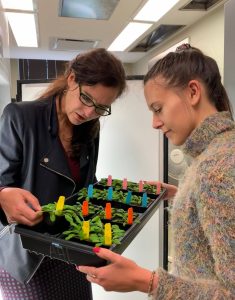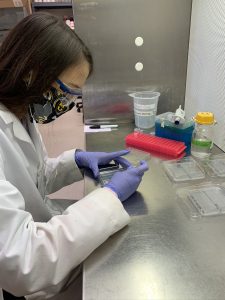Tessa Jennings found a passion for plant sciences as a high school FFA student participating in career development events. That passion has continued to grow as a student at the University of Missouri – especially after being selected as a member of the Freshman Research in Plants (FRIPS) Program in 2018.
For the past two years, Jennings, a junior majoring in plant sciences, has worked in the lab of Antje Heese, an associate professor in the Department of Biochemistry.

“Being able to work in Dr. Heese’s lab has been one of the greatest things about my college experience,” Jennings said. “A standout experience for me is being able to see how all of my experiments come together when I am putting together my research presentations. Also, I really like being able to form relationships with my lab members and with other people who I meet through lab events.
“I would also like to acknowledge the FRIPS Program and the Dudley Alexander Undergraduate On-Campus Research Internships Gift Fund, through the CAFNR Undergraduate Research Internships, for making my research possible. I would also like to thank the Heese lab and my mentor, Kelly Mason, who is a biochemistry PhD student, for their continual support.”
Jennings grew up in Ashland, Mo., and while she didn’t have a background in agriculture, joining FFA opened the door to several new possibilities.
“Although I have always lived in a rural community, I wasn’t aware of the importance of the agriculture industry until high school,” Jennings said. “Becoming an active member in the National FFA Organization opened my eyes to agriculture and helped me determine that I wanted to go into this industry. Since then, it only felt natural for me to pursue a degree in plant sciences. I chose Mizzou because I wanted to be close to home, and I knew that CAFNR has an excellent program.”
Jennings applied to and was accepted as a member of the FRIPS Program during her first semester as MU.
“This program is designed to expose new Mizzou students who are interested in a plant biology career to plant research,” Jennings said. “I reached out to Dr. Heese because I was interested in the research that her lab performs on understanding how plants defend themselves against bacterial pathogens on a cellular level, and I have been working in the lab ever since.”
In the Heese lab, Jennings is responsible for research related to how clathrin-coated vesicle components make sure that proteins with immune functions are transported to the area within that cell at which they function. Clathrin is a protein that plays a vital role in coated vesicle formation.
“The Heese lab is interested in vesicular trafficking proteins that affect plant responses and help prevent pathogens from infecting the model plant Arabidopsis and the crop species maize,” Jennings said. “Every year, pathogens can be detrimental to farmers and significantly reduce their crop yield. By understanding how plants respond to pathogens, we can communicate new ways for farmers to prevent crop loss by pathogens. This is especially important for the production of enough food to sustain the rapidly growing world population.”

Jennings said that as a plant sciences student, it took her a little bit to adjust to some of the concepts of biochemistry. Heese said Jennings is now her go-to-person for when lab members have questions about plant anatomy or plant physiology.
“I truly enjoy having Tessa in my lab!” Heese said. “I appreciate that as an undergraduate majoring in plant sciences, Tessa contributes to the interdisciplinary nature that I try to nurture by recruiting students with diverse science backgrounds into my lab.
“Tessa is very observant and astute, in that she has identified growth defects in our mutant plants that eluded others in my lab. Tessa’s joy in working with plants is on clear display when she plates seeds, transplants seedlings into soil or performs plant growth measurements. Because of her ‘green thumb’ and attention to detail when handling our plants, I have asked Tessa last year to help train incoming PhD students in plant propagation techniques.”
Jennings’ undergraduate research work showcases CAFNR’s “RISE” Initiative, which includes Research, International, Service learning and Experiential learning. Jennings’ work falls under the Research section, which opens the door for undergraduate students to gain research experience throughout their time in CAFNR.
“Doing undergraduate research has helped me prepare for my future career in many ways,” Jennings said. “I have learned several techniques that are used in industry. I have learned how to analyze and present my data. I have also become more confident in my abilities to perform research and am becoming more independent.”
“Undergraduate research provides our students with critical hands-on experiences in a real-world setting that allows them to make educated decisions on whether bench research is the correct career path for them,” Heese added. “In addition, authentic bench-based training advances their skill sets and makes our undergraduate students more competitive in the next step of their career, whether it is applying for graduate school or for a job in industry.”